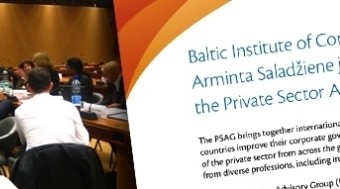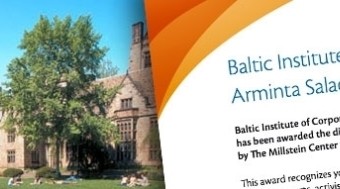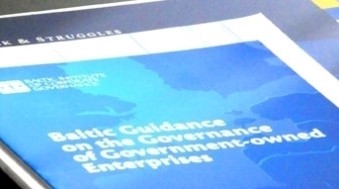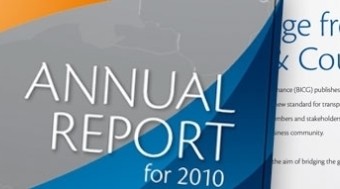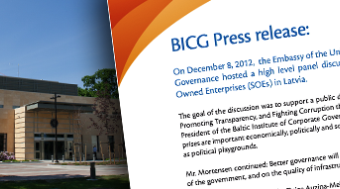
The goal of the discussion was to support a public debate and efforts towards improving Latvia’s economic outlook, promoting transparency, and fighting corruption through innovative solutions to the unique challenges facing SOEs.
Kristian Kaas Mortensen, President of the Baltic Institute of Corporate Governance (BICG), said: “Latvian State-Owned Enterprises are important economically, politically and socially. They are too important to tolerate inefficiencies, or their use as political playgrounds.”
Mr. Mortensen continued: “Better governance will have a positive impact on the state budget, the public’s perception of the government, and on the quality of infrastructure and services”.
The Panel discussion was led by Daiga Auziņa-Melalksne, Chair of the Management Board at Nasdaq OMX Riga. Ms. Auziņa-Melalksne said: “Proper governance requires depoliticisation of decision making and the operational separation of the state’s shareholder oversight from its industrial policy and regulatory functions.”
Other speakers at the event were: Mr. Lars-Erik Frederiksson, Special Advisor in the Swedish Governments State Ownership Unit, located in the Ministry of Finance, Mr. Martin Gauss, CEO of airBaltic, Mr. Juris Puce, State Secretary, Latvian Ministry of Economy and Mr. Adomas Audikas, Advisor to the Minister, Ministry of Economy of Lithuania.
The event focused on international best practise such as:
A written ownership policy needs to guide the state. It should define: the purpose of state ownership; what institutions represent the interests of the state; expected outcomes of state ownership; and the methods by which the outcomes are to be achieved.
A professional Board of Directors/Council is essential for directing the enterprises and holding management to account. Members of the Board of Directors/Council should be professional and competent, and not nominated based upon political considerations.
Professional managers are best suited to manage commercial enterprises. They require operational autonomy. At the same time, managers need to be held fully accountable for their performance.
The U.S. Ambassador Judith Garber said: “Corporate governance of State-Owned Enterprises is a major challenge in many economies, including Latvia. One of the main challenges is for the government to exercise its ownership functions without undue political pressure and interference in the company’s management.”
Contact for further details:
Kristian Kaas Mortensen
km@corporategovernance.lt
+370 6111 33 44

